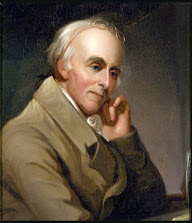Welcome back viewers
This week's hero is...
Dr. Benjamin Rush
Benjamin Rush was born on December 24, 1745. He grew up in the small town of Byberry just 12 miles from Philadelphia. When Ben was only six, his father (John Rush) unexpectedly died. His mother then sent him to live with an aunt and uncle so that he could receive a better education. He went on to study at the College of New Jersey. After receiving his Bachelor's degree, Rush returned to Philadelphia and decided to study medicine. In June 1768, he finally received his medical degree and became a well-known doctor in Philadelphia. However, his expertise in medicine would not be his only major contributions to his country.
When he returned to Philadelphia in 1769, Dr. Rush quickly put his new skills to good use. He wrote numerous papers on medical techniques, politics, and the abolition of slavery. He eventually became a chemistry professor at the College of Philadelphia, where he published the first American textbook on chemistry. His activities eventually caught the eyes of the Sons of Liberty. In 1776, Dr. Rush met a man named, Thomas Paine. Paine was very impressed with Rush's writings on the political situation that was brewing in the colonies and urged him to join the Continental Congress in Philadelphia. Dr. Rush did so in June of that year.
On July 4th, Benjamin Rush voted on the resolution of Independence and signed the Declaration. Almost immediately after, he left Philadelphia and joined the Continental Army where he was appointed, Surgeon-General. However, this appointment led Rush into a nasty dispute between himself and George Washington. Rush was highly critical of the Continental Army's medical service under the Administration of Dr. William Shippen. When Rush accused Dr. Shippen of poor management, Washington deferred to Congress. And when both the Congress and Washington sided with Shippen on the matter, Rush angrily resigned in protest. He would never forgive Washington for this. His unresolved conflict with George Washington would ultimately end Dr. Rush's direct involvement in the Revolutionary War.
In 1778, Benjamin Rush returned to Philadelphia where he resumed writing medical papers. He wrote specifically on the study of medical care and mental health. He became a major supporter of the US Constitution and advocated for scientific education, building public medical clinics, and abolition of slavery. By 1789, Rush had become a leading pioneer in studying physiology and psychiatry. In 1797, he was appointed, Treasurer of Mint, a position he held until his death on April 13, 1813.
Due to his poor relationships with other founding fathers (namely, George Washington, John Adams, and Benjamin Franklin), the contributions made by Benjamin Rush were largely forgotten in the aftermath of the Revolution. However, Rush's research and medical papers were instrumental in many advances in the scientific community. Today, he is remembered as both a founding father and revolutionary medical doctor whose studies saved thousands of people in the United States.
https://www.uphs.upenn.edu/paharc/features/brush.html
https://www.ushistory.org/declaration/signers/rush.html
https://www.americanheritage.com/paradoxical-doctor-benjamin-rush
https://web.archive.org/web/20040126092811/http://deila.dickinson.edu/theirownwords/author/RushB.htm

No comments:
Post a Comment